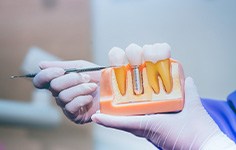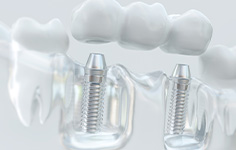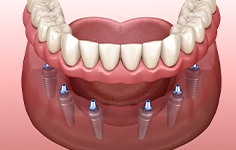Dental Implants - Parsippany-Troy Hills, NJ
The Modern, Life-Changing Solution to Tooth Loss

A missing tooth means you're missing out on more than just smiling. It can have a negative impact on your confidence and your overall wellbeing, too. Dental implants can help you eat, laugh, and talk with ease once again.
Why Choose Zen Dental Care for Dental Implants?
- Unparralled Comfort
- Natural Look
- Preserve Oral Health
Why Should I Choose Dental Implants?

After losing a tooth or having one extracted, it’s important to consider all your replacement options. Dental implants in Parsippany-Troy Hills can restore the functionality of your bite and improve your overall oral health. As one of the most secure and long-lasting tooth replacement options available, dental implants act as a natural part of your smile and replace that missing tooth you’ve been hiding.
No Guesswork, More Comfort
With cone-beam computed tomography, or CBCT technology, we give our patients peace of mind. This reliable technology ensures precise placement for increased patient comfort and better overall outcomes.
The Latest Techniques in Dental Implantology
Dr. Elsaid has taken numerous CE courses on dental implants to bring the best and latest techniques to her patients. Rest assured, your smile is in expert hands.

$500 Off Your
Dental Implants!*
INCLUDES
- Treatment Plan
- Implant Placement
- Custom Restoration
Get Started On The Right Path!
We are honored that you’ve chosen us to help you regain your oral health. To show our gratitude, we are offering our patients an exclusive dental implant special. Get the high-quality care your smile deserves today.
*restrictions may apply
Call now (973) 564-1840The 4-Step Dental Implant Process

The timeline for getting dental implants can vary from patient to patient depending on their specific needs. Generally speaking, it can take several months to over a year to complete the process of rebuilding your smile. Below is a step-by-step breakdown of what you can expect to happen when you choose to get dental implants. Rest assured that it will all be worth it once you start enjoying the many benefits of your reliable new grin.
Initial Dental Implant Consultation

Before anything else, you will need to have your mouth carefully examined in order to answer one simple question: are you a candidate for dental implants? For many patients, the answer will be yes, although some might need to have bone grafting, gum disease treatment, or other preliminary procedures performed first. After the necessary preparations have been taken care of, your dental implant surgery will be scheduled.
Dental Implant Surgery

A local anesthetic will be used to keep your mouth numb for the procedure. Then a small incision will be made in the gums. An appropriate number of implant posts will be inserted into your jaw. The location and angle of each post will be carefully determined beforehand; after all, precision is key when it comes to making sure that your dental implants are successful. Once the implants have been placed, the gums will be sutured shut, and each implant post will receive a protective cap.
Dental Implant Osseointegration & Abutment

Dental implants need to be able to form a lasting bond with your jawbone. This process is known as osseointegration, and it is a vital step in making sure that your new smile lasts. It will normally take about three to six months for your implant posts to fuse with the bone.
After osseointegration, it will be time for you to receive your abutments. These are small connector pieces made out of metal. The purpose of an abutment is to help attach the final restoration to the implant posts.
Delivery of Dental Implant Restoration(s)

The final step is to design and place the final restoration. The exact type of restoration you receive depends on how many teeth need to be replaced. If you have only lost one tooth, you can fill the gap in your grin with a single implant post and a crown; meanwhile, replacing an entire arch of missing teeth often requires dentures attached to four or more posts.
Whatever type of restoration you need, it will be personalized for you based on an impression of your teeth, allowing it to look like a natural part of your mouth. Once the final prosthesis is ready, it can be anchored to your dental implant posts with the help of the abutments; at that point, your new smile will be complete.
Benefits of Dental Implants

The benefits of dental implants in Parsippany go far beyond aesthetic. Because they restore the entire structure of missing teeth, patients who invest in this leading-edge tooth loss solution can benefit their confidence, psychological wellbeing, and overall health. We invite you to read a little more about the advantages of choosing implants below, and remember to schedule a consultation to learn more about the process!
Day-to-Day Benefits

- Easy Daily Maintenance: Implant restorations are permanently secured within your mouth, meaning you won’t need to take them out to clean or soak them like you would with traditional removable prosthetics like dentures. Instead, simply brush and floss your replacement teeth just like your natural ones. It’s also crucial to attend routine checkups and cleanings with Elsaid.
- Boosted Confidence: With dental implants, you’ll never have to worry about your restoration slipping or shifting within your mouth, making something as simple as talking embarrassing and uncomfortable. Your replacement teeth will remain firmly atop your gums so you can smile, talk, and eat with greater confidence.
- Eat a Wider Variety of Foods: Due to their enhanced stability, having an implant restoration means you’ll be able to eat a greater variety of foods and chew them more easily. This can benefit your nutritional intake as well as allow you to eat key food groups that are essential to your health.
Health Benefits

- Prevent Jawbone Erosion: Even if you invest in traditional dentures, these won’t stimulate your jawbone like your natural teeth once did. Because of this, with time, you’ll find that your jawbone will erode, causing your cheeks to appear hollow. Dental implants are biocompatible, which means they’re able to fuse with your jawbone through a natural process called osseointegration. This provides the bone with necessary blood flow and stimulation to keep it from deteriorating with time.
- Reduce Risk of Health Conditions Related to Tooth Loss: Tooth loss has been connected to an increased risk of diseases. By replacing these teeth and filling the gaps within your mouth, you can experience a decreased chance of developing oral and overall health conditions associated with tooth loss.
Long-Term Benefits

One of the primary long-term benefits of dental implants is the fact that with good oral health and routine cleanings, you can continue enjoying them for over 30 years. Not only does this mean fewer visits to the dentist for costly replacements and relinings, but it also helps you get the most out of life without the lingering threat of a failing prosthetic.
Understanding the Cost of Dental Implants

Dental implants are capable of doing incredible things for just about anyone who is missing their teeth. However, many prospective patients are intimidated by the price of the procedure. We don’t want the financials to stand in the way of you getting the care that you need, so we do everything that we can to make payment as painless as possible.
When we meet, we’ll give you a complete analysis of what you can expect your dental implants to cost you. Here’s what you should know about the financial component of the treatment until then.
Preliminary Treatments & Dental Implant Surgery

Preliminary treatments such as gum disease therapy, tooth extractions, or bone grafting can increase the overall cost of dental implant surgery. These treatments are often necessary to ensure the success of the implants. While they do add to the total expense, they are important for long-term results. Some of these costs may be partially covered by dental insurance. Since we offer many necessary treatments in-house, you won’t need to work with an outside surgeon, helping streamline both the process and expenses for a more convenient experience. If we do not offer the service you request, we’ll be sure to connect you with an experienced and affordable specialist in the area.
The Parts of Your Dental Implant

The cost of dental implants is influenced by several factors. The number of implants plays a role—replacing a single tooth costs less than multiple implants for dentures, though dentures may be more cost-effective overall. The type of restoration (crown, bridge, or denture) and its size or material, like zirconia or titanium, also affect the price. Additionally, different implant brands vary in cost based on their features and intended use. We’re happy to explain the brand and specific benefits of the implants you’ll receive.
How Dental Implants Pay for Themselves

Dental implants can save money long-term by providing a durable, permanent solution for missing teeth. Unlike dentures or bridges, which often require adjustments, replacements, or special maintenance, implants integrate with the jawbone, offering a stable and lasting option. This reduces the need for frequent dental visits or replacement costs over time. Additionally, implants help prevent bone loss, which can lead to further dental issues or costly treatments. By maintaining oral health and preserving jaw structure, implants minimize the future expenses associated with dental care and restorations.
Does My Dental Insurance Cover Dental Implants?

Dental insurance typically offers limited coverage for dental implants. While many insurance plans cover parts of the procedure, such as preliminary treatments (extractions or bone grafts) or the crown placed on the implant, they may not fully cover the implant itself. Coverage depends on the specific plan, with some classifying implants as cosmetic procedures, which reduces benefits. However, more insurance companies are starting to recognize the medical necessity of implants, offering partial coverage. We recommend checking with your provider to understand your specific benefits and out-of-pocket costs for implant procedures.
Making Dental Implants Affordable

We’re also acutely aware that many patients we see are uninsured. We still want you to be able to improve the quality of your smile despite that fact. One tool you might find useful if you’re in that position is financing, a service that can allow you to split the cost of your services across several monthly payments. We often work with CareCredit, which is an organization that offers low-to-no interest payments for patients who qualify. If you have questions about these or any other financial services available to you, make an appointment with us for a consultation today!
Who Dental Implants Can Help

Whether you’re missing a single tooth or multiple teeth, dental implants can give your smile back and improve your quality of life in many ways. From their excellent durability to their ability to prevent jawbone deterioration, they offer many benefits that can make you more comfortable. But who truly benefits from dental implants? At Zen Dental Care, we believe everyone can! Read more below to discover the best qualities of dental implant candidates. If you decide you want to know more, call us to schedule a consultation.
Who Is a Good Candidate for Dental Implants?

When it comes to dental implants, age is just a number. What really matters is your health and a positive attitude! A good candidate for dental implants is someone who:
- Has lost teeth due to injury, decay, infection, or other means.
- Is in generally good health with no major systemic conditions like uncontrolled diabetes or heart disease.
- Has adequate jawbone density to support the implant.
- Displays good oral health practices for healthy gums and has a commitment to oral hygiene.
- Doesn’t smoke or vape or is willing to reduce their usage or quit these habits.
Even if you've experienced some bone loss, or have gum disease at the moment, our team will work with you to treat these issues and prepare you for implants. So, there’s no reason to worry if you currently don’t meet one or more of these qualifications.
Missing One Tooth

If you are missing just one tooth, a single dental implant is ideal! The implant is surgically placed in the jawbone to replace the missing tooth’s root. Once healed, a custom crown is attached to the implant, seamlessly filling the gap.
Unlike a dental bridge, which may require altering neighboring teeth, an implant is a standalone solution that preserves your natural teeth while stopping bone loss in its tracks. The result is a natural-looking, durable replacement that functions like your original tooth and blends seamlessly into your smile.
Missing Multiple Teeth

For patients missing multiple teeth, dental implants can be used to support a bridge or individual crowns. Instead of relying on adjacent teeth for support, implant bridges are anchored directly into the jawbone, providing a stable prosthetic that will outlast traditional versions.
Missing All Teeth

If you're missing all your teeth, fully implanted dentures offer a fantastic permanent solution. The problem most patients have with traditional dentures is that they can slip or cause discomfort. With the help of dental implants, your dentures can be more aesthetically pleasing while providing a comfortable fit that restores the majority of your bite force.
This means that these dentures look and function more like natural teeth, allowing you to eat, speak, and smile with confidence. Implants also prevent facial collapse which is often associated with traditional denture wear, preserving your bone density and facial structure for a more youthful appearance over time.
Maintaining & Caring for Your Dental Implants

At Zen Dental Care, our goal for each and every patient is the same: to deliver custom care that results in a beautiful, healthy smile. With dental implants specifically, we want you to enjoy renewed confidence, a strong bite, and improved speaking patterns for the next several decades. In this next section, we’re sharing what to do (and what not to do) so you can!
Make Oral Hygiene a Priority

Although your dental implants cannot decay, your gums can develop an infection. So, even if you don’t have any of your natural teeth left, you need to commit to a good oral hygiene regimen at home. The best place to start is with the basics, like brushing for two full minutes each morning and evening. If you would like product recommendations, you can always ask us – we’re here to help!
Eat a Healthy Diet

Your diet should be filled with essential vitamins, minerals, and nutrients. That way, your body has everything it needs to keep your gums healthy and your jawbone strong. Of course, it’s equally as important that you avoid extremely crunchy foods, like hard pretzels, and keep ones with added sugar to a minimum to preserve your healthy, happy smile.
Break Bad Habits

Since smoking dramatically increases your risk of dental implant failure, it’s important that you don’t use any tobacco products. It’s also important that you don’t bite your nails, drink alcohol excessively, chew on ice cubes, or use your teeth as tools to open things. That way, your dental implants, your teeth, and your gums stay in pristine condition throughout the years.
Protect Your Dental Implants

Whether you participate in a contact sport, like football, or you like to stay active by lifting weights, riding your bike, or running, you need to protect your smile from unforeseen impact. So, make sure that you wear a mouthguard! If you grind or clench your teeth at night, we can also have a custom nightguard made so both your teeth and your dental implants are protected from the pressure.
Schedule Regular Dental Checkups

You may have heard otherwise, but you do need to schedule a dental checkup and cleaning biannually – even if you don’t have any of your natural teeth left. At each appointment, we screen for oral cancer, check for gum disease, and remove built-up plaque and tartar to reduce your risk of common dental problems. So, make sure you get one on the calendar every six months!
Dental Implant Post-Op Instructions

It’s important to remember that recovery is one of the most essential parts of the dental implant process. Without proper care, you can end up risking failure, which can come with a wide range of complications. To ensure that you have an efficient and swift healing period, here are some of the common dental implant post-op instructions that our team will provide.
What to Do Directly After Dental Implant Surgery

The blood clot that is meant to form around the surgical site will be critical, so you’ll need to avoid disturbing its process. To prevent any disruptions with your healing, you’ll want to get plenty of rest as well as implement the following tips:
- Avoid touching the area with your tongue or fingers
- Do not use a straw when drinking something
- Do not spit; swallow your saliva or use a tissue instead
- Refrain from using tobacco products
Common Side Effects When Recovering from Dental Implant Placement
Here are some of the common symptoms patients might experience after receiving their dental implants:
- Swelling: Inflammation is likely to occur within the first 72 hours following your surgery. To minimize this, apply a cold compress to the outside of your cheek.
- Bleeding: Due to the formation of the blood clot, it’s normal to experience intermittent bleeding for a few days. Try using a clean washcloth or gauze to control it.
- Pain: Soreness and tenderness are typical side effects after dental implant surgery. Make sure to take prescribed or over-the-counter painkillers to minimize discomfort.
Your Diet After Dental Implant Surgery

To recover properly, you’ll need to allow your surgical site to completely heal without disruption. When eating, you should stick to softer foods until you can reintroduce options with tougher textures. These may include:
- Scrambled eggs
- Mashed potatoes
- Apple sauce
- Pudding
- Yogurt
- Ice cream
Post-Op Health & Oral Hygiene

Most patients can resume brushing their teeth like normal the day after their surgery, but make sure you scrub carefully around the implant site. In fact, you should mostly rinse your mouth gently with salt water to keep the area clean and disinfected. Use mouthwash that doesn’t contain alcohol, as this can irritate the surgical site.
What to Do After Your New Teeth Are Attached

Once you’ve completely healed, you’ll return to our office to receive your brand-new custom dental crown, bridge, or denture. Your restoration/prosthetic will be attached to your implant(s) and our team will verify that your bite is correct and that you’re satisfied with the results. While you shouldn’t experience any discomfort, bleeding, or swelling afterward, it’s important to notify our team for help if you do notice something abnormal. Feel free to give us a call if you have any questions!
Frequently Asked Questions
Can I get a dental implant in one day?
In some cases, you may be able to get a dental implant in just one day, depending on the type of implant you will be receiving. In these cases, the restoration your doctor provides will be a temporary appliance to keep your tooth healthy and functional until you have fully healed from your dental implant placement surgery. With your temporary restoration, you’ll be able to speak and eat normally during the healing process.
Your doctor will schedule a series of follow-up appointments to track your healing process and take impressions of your teeth. These impressions will help the lab create your custom-made restoration. Your permanent restoration will be durable and more natural-looking than your temporaries. We recommend coming in for a consultation to see what type of dental implant might work best for you.
Do dental implants stop bone loss?
Yes. After losing a tooth, your jaw will no longer be stimulated by the natural pressure of chewing and biting. This causes bone loss to occur and also weakens the jawbone.
When the dental implant post is placed, it will bond directly into the jawbone and act as an artificial tooth root. This titanium “tooth root” transmits the force of chewing and biting through the dental crown and into your jawbone just like a real tooth would, keeping it healthy and strong.
Can my dental implant become infected?
Yes, dental implants can become infected, but this is a very rare complication. This type of infection is known as “peri-implantitis,” and usually only occurs if the implant is not kept clean or is not properly cared for after surgery.
Follow your doctor’s instructions while recovering and be sure to brush and floss regularly after your implant has healed to avoid peri-implantitis and maintain a healthy implant.
How long will my dental implant last?
When placed properly and maintained with care, dental implants can last for 30 years or more. In fact, It’s quite common for patients to keep their implants for the rest of their lives.
The implant restoration, however, may not last as long. Restorations such as dental crowns or overdentures take on regular wear and tear from chewing, biting, and more. After time, the restoration may need to be replaced to keep your smile healthy and functional. By coming in for regular exams, your dentist can check to ensure your restoration is in good condition.
How are dental implants made?
Titanium dental implants are made in trusted laboratories that supply a wide selection of pre-selected standard post sizes. The restoration, on the other hand, is a custom-made appliance. This ensures each patient gets a result that meets their exact needs. Your doctor will either make your dental implant in-house using a milling machine, or they will send detailed impressions to a partner lab.
This lab will create a long-lasting, resilient dental implant restoration just for you. Most crowns are crafted out of porcelain which is durable and looks uniquely similar to tooth enamel. Once the crown is ready, the lab will send it back to our office, and we will complete the procedure by securely attaching your implant crown in place.
What is a single tooth implant?
Single tooth implants are the most frequently used dental implant and are made up of two main parts. The first is the dental implant, which is a titanium rod with a screw-like shape. The second part is the dental crown, or restoration, which will be attached to the titanium rod. This dental crown reinstates the shape, function, and appearance of your natural tooth. Unlike a partial denture, single-tooth implants are extremely durable and never move or shift.
